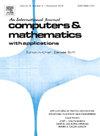On full linear convergence and optimal complexity of adaptive FEM with inexact solver
IF 2.5
2区 数学
Q1 MATHEMATICS, APPLIED
引用次数: 0
Abstract
The ultimate goal of any numerical scheme for partial differential equations (PDEs) is to compute an approximation of user-prescribed accuracy at quasi-minimal computation time. To this end, algorithmically, the standard adaptive finite element method (AFEM) integrates an inexact solver and nested iterations with discerning stopping criteria balancing the different error components. The analysis ensuring optimal convergence order of AFEM with respect to the overall computational cost critically hinges on the concept of R-linear convergence of a suitable quasi-error quantity. This work tackles several shortcomings of previous approaches by introducing a new proof strategy. Previously, the analysis of the algorithm required several parameters to be fine-tuned. This work leaves the classical reasoning and introduces a summability criterion for R-linear convergence to remove restrictions on those parameters. Second, the usual assumption of a (quasi-)Pythagorean identity is replaced by the generalized notion of quasi-orthogonality from Feischl (2022) [22]. Importantly, this paves the way towards extending the analysis of AFEM with inexact solver to general inf-sup stable problems beyond the energy minimization setting. Numerical experiments investigate the choice of the adaptivity parameters.
非精确求解自适应有限元法的全线性收敛性和最优复杂度
偏微分方程的任何数值格式的最终目标是在准最小的计算时间内计算出用户规定精度的近似值。为此,在算法上,标准的自适应有限元法(AFEM)集成了一个不精确求解器和嵌套迭代,并具有识别停止准则来平衡不同的误差分量。保证AFEM在总计算代价下的最优收敛顺序的分析,关键取决于合适准误差量的r -线性收敛概念。这项工作通过引入一种新的证明策略来解决以前方法的几个缺点。以前,对算法的分析需要对几个参数进行微调。本文在经典推理的基础上,引入了r -线性收敛的可和准则,消除了对这些参数的限制。其次,通常的(拟)毕达哥拉斯恒等式假设被Feischl(2022)[22]的广义拟正交概念所取代。重要的是,这为将非精确求解器的AFEM分析扩展到能量最小化设置之外的一般中频稳定问题铺平了道路。数值实验研究了自适应参数的选择。
本文章由计算机程序翻译,如有差异,请以英文原文为准。
求助全文
约1分钟内获得全文
求助全文
来源期刊

Computers & Mathematics with Applications
工程技术-计算机:跨学科应用
CiteScore
5.10
自引率
10.30%
发文量
396
审稿时长
9.9 weeks
期刊介绍:
Computers & Mathematics with Applications provides a medium of exchange for those engaged in fields contributing to building successful simulations for science and engineering using Partial Differential Equations (PDEs).
 求助内容:
求助内容: 应助结果提醒方式:
应助结果提醒方式:


